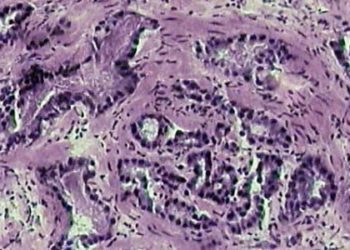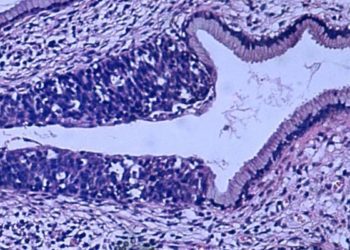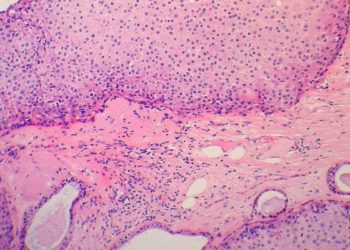Hyperfractionated radiotherapy reduces complication rates compared to standard fractionation for locally advanced nasopharyngeal carcinoma
1. Fewer patients in the hyperfractionation group reported grade 3 or worse late radiation-induced complications compared to the standard fractionation group.
2. 3-year overall survival was significantly increased in the hyperfractionation group.
Evidence Rating Level: 1 (Excellent)
Study Rundown: Nasopharyngeal carcinoma has a high prevalence with an increased risk of relapse following radical radiotherapy. There is limited evidence surrounding the use of a safer means of radiotherapy delivery without compromising the total radiation dose. This randomized controlled trial aimed to assess the safety and efficacy of hyperfractionation (65 Gy in 54 fractions given twice daily) versus standard fractionation (60 Gy in 27 fractions given once a day) of radiotherapy in patients with locally advanced nasopharyngeal carcinoma. The primary outcome was the incidence of grade 3 or worse late radiation-induced complications while key secondary outcomes include overall survival and quality of life. According to study results, hyperfractionated intensity-modulated radiotherapy resulted in significantly improved overall survival and fewer grade 3 or worse complications compared to the standard fractionation group. This study was strengthened by a large sample size of individuals of all ages.
Click to read the study in The Lancet
Relevant Reading: Gemcitabine and Cisplatin Induction Chemotherapy in Nasopharyngeal Carcinoma
In-depth [randomized-controlled trial]: Between Jul 10, 2015, and Dec 23, 2019, 178 patients were screened for eligibility across 3 centers in Guangzhou, China. Included were patients between 18-65 years with histologically confirmed differentiated or undifferentiated, non-keratinizing, locally advanced recurrent nasopharyngeal carcinoma. Altogether, 144 patients (72 each in the hyperfractionation and the standard fractionation groups) were included with the majority (76%) being male. The primary endpoint of grade 3 or worse late radiation-induced toxicity was significantly lower in the hyperfractionation group than the standard group (34% vs. 57%, respectively, p=0.023). Similarly, there were fewer grade 5 late complications in the intervention group (7% nasal hemorrhage vs. 16% nasal hemorrhage). The 3-year overall survival was better in the hyperfractionation group versus standard fractionation (74.6% vs. 55.0%, hazard ratio [HR] 0.54, p=0.014). Findings from this study suggest that hyperfractionation significantly improves survival in adults with locally advanced nasopharyngeal carcinoma.
Image: PD
©2023 2 Minute Medicine, Inc. All rights reserved. No works may be reproduced without expressed written consent from 2 Minute Medicine, Inc. Inquire about licensing here. No article should be construed as medical advice and is not intended as such by the authors or by 2 Minute Medicine, Inc.







